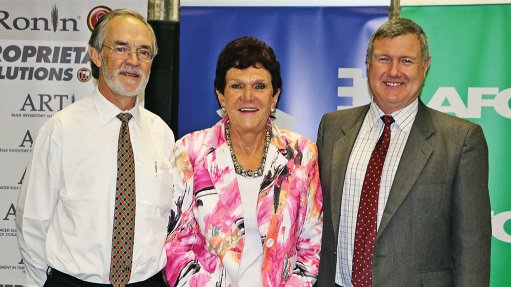
Given the drought and an estimated smaller maize crop, an effective maize import programme is essential to ensure food security for South Africa’s population. In this regard the grain handling chain is acquitting itself excellently of its task.
By March this year more than a million tons of South American yellow maize had already been imported through the Cape Town, East London, Durban and Port Elizabeth harbours, and white-maize imports from the USA and Mexico will follow soon. In addition, the grain traders, harbour authorities, Transnet and transport companies are still handling the normal imports of commodities like wheat, grain sorghum, soybeans, sunflower seeds and oilcake for the stock feed industry.
‘The gigantic task is being carried out excellently and the grain-handling chain deserves to be complimented on this,’ said Annatjie Loio, president of the Grain Handling Organisation (GOSA) at their 33rd annual symposium in Langebaan in the Western Cape on 16 March. She was re-elected as GOSA president at the symposium.
According to Loio, the agricultural sector is currently under pressure because of the drought, the weakening of the rand and a lack of leadership from the government. Although the weaker rand is the direct result of the government’s appointment of three ministers of finance in one week, it is the consumer who suffers and has to absorb higher prices.
The economist Dr Roelof Botha said at the symposium that the ministers of finance debacle is currently costing the country a monthly import account of R9,3 billion, which is equal to 200 000 low-cost houses, or 37 Nkandlas per month. However, on a positive note he feels that a credit downgrade for the country is unlikely at this stage.
South Africans must realise that climate change could have a further negative impact on the agricultural industry. Prof. Kobus van der Walt from the North-West University mentioned at the symposium that statistics show that global temperatures could rise by up to 11°C by the end of the century, with extreme weather conditions being common. He expects a physical water shortage in 2025, which will force the local agricultural sector to produce crops more efficiently with less water.
Other speakers at the symposium were the strategist Dr Clem Sunter, Steve Hochfeld from Hochfeld Grains, Marion Delport from the Bureau for Food and Agricultural Policy (BFAP), the motivational speaker Rian Truter, and the political analyst Dr Piet Croucamp.
The latter was part of an interesting panel discussion, together with Kallie Schoeman from Schoeman Boerdery and Johan van der Watt from ABSA. Consolidation of the agricultural sector was discussed, as well as how the drought can provide further momentum for consolidation. Delegates to the symposium consisted of grain handlers like Afgri, Senwes, NWK, Suidwes, OVK and BKB, as well as the processing and distribution industries, financiers, grain traders, input providers and statutory role-players. Loio mentioned the good attendance figures and increasing membership, which enables the organisation to act as medium for industry-specific information. At an annual general meeting GOSA’s council was unanimously re-elected, after which the facilitation of training workshops in the industry was discussed.